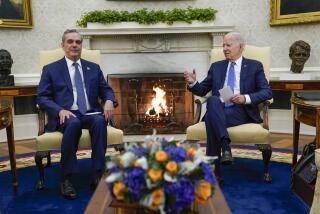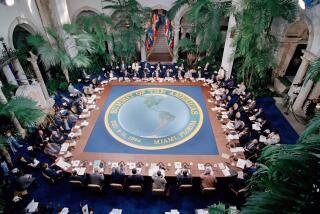U.S. Seeking More Control Over Latin Loans
MIAMI — U.S. efforts to gain control over billions of dollars of loans to Latin American countries dominated talk among hundreds of bankers and Latin finance ministers gathering here Sunday for a conference of the Inter-American Development Bank.
Even though the policy-making board of the IADB yesterday put off any decision on power sharing until mid-June, the issue was likely to remain a source of dispute and uncertainty at the bank’s three-day annual meeting opening today.
“There is some feeling of relief that the matter has been deferred, but the tension is hanging pretty thick because of the U.S. demands,” said one senior official of the 44-nation IADB, which disburses loans to Latin debtor countries.
The decision came as a relief to most IADB officials, who also have braced themselves for fierce debate between U.S. and Latin delegates on another contentious issue--Brazil’s moratorium on interest payments.
At issue is a U.S. demand that the bank, controlled by the Latin borrowing nations, change its voting system to give Washington virtual veto power over loans, which total about $3 billion a year.
Finance officials said they were awaiting a speech today by Treasury Secretary James A. Baker III--chief architect of U.S. strategy on Third World debt--in hopes that he would signal the outlines of a possible compromise.
The United States, which contributes about one-third of the bank’s resources, views its current lending practices as too lax and has threatened to scuttle plans for a $20-billion to $25-billion capital infusion.
Brazilian Central Bank President Francisco Gros scheduled formal talks here Sunday with creditor banks for the first time since his country suspended interest payments on its $68-billion commercial debt last month. Brazil’s total debt is $108 billion.
Led by Citicorp, the banks were expected to take a tough line with Brazilian officials, pressing them for a program to stabilize their economy and a timetable for the resumption of interest payments, banking sources said.
Brazil’s moratorium has been seen as the catalyst for a new round in the 5-year-old Third World debt crisis, raising concern about potential damage to the profits of its U.S. creditor banks.
Latin officials strongly oppose changes in the IADB voting system.
More to Read
Sign up for Essential California
The most important California stories and recommendations in your inbox every morning.
You may occasionally receive promotional content from the Los Angeles Times.










